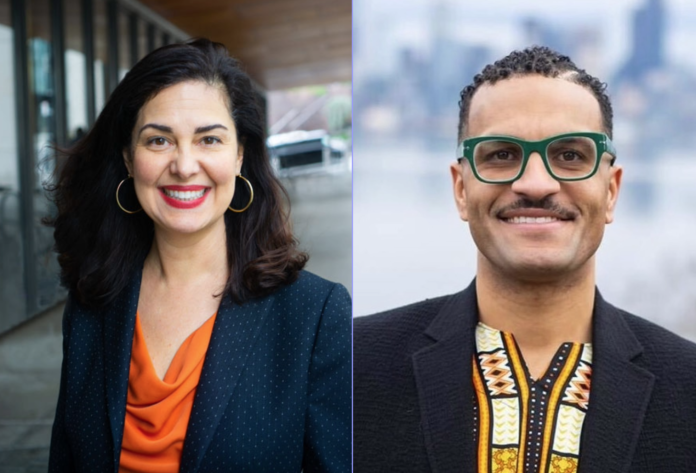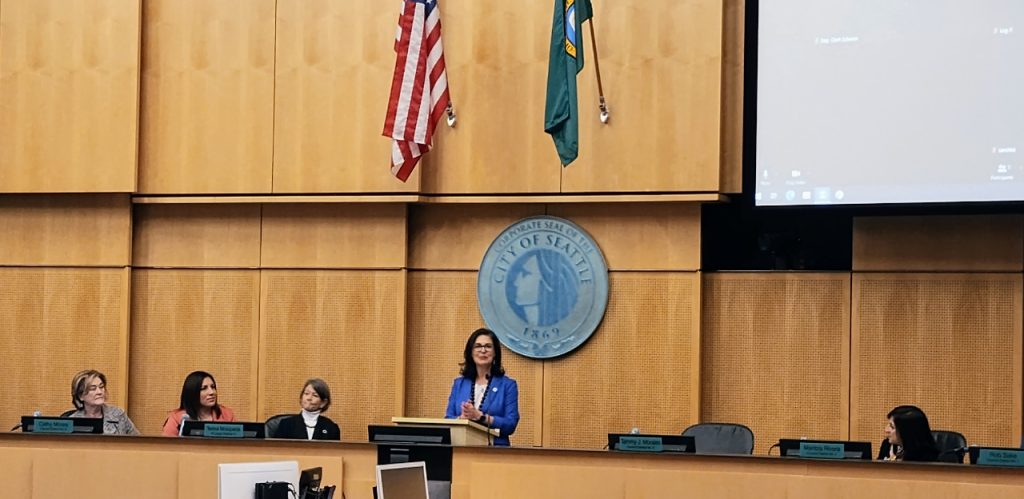
Morales is in as land use chair, “Pothole King” Saka to lead transportation, and Strauss claims budget chair.
On Tuesday afternoon, the brand new Seattle City Council convened for the first time since the election of five new members last fall and voted in a new council president in Sara Nelson, a citywide councilmember two years into her first term. The council also approved a slate of committee assignments for the next two years, with big shakeups given the high turnover and centrist shift in the new council.
District 2 Councilmember Tammy Morales, now one of the longest tenured members of the council, is set to chair the Land Use Committee during a year Seattle faces a state-imposed deadline to update the city’s Comprehensive Plan by December 31, with the potential for a major shift in housing policy. That update is well behind schedule, as the Harrell administration has sat on and tinkered with a draft plan for much of 2023, denying the public a chance to review their progress.
Saka touts ‘back to basics’ ahead of big levy renewal
Newly elected District 1 Councilmember Rob Saka will be taking over as transportation chair. Saka, who has no prior legislative experience, will lead one of the city’s busiest committees — one that oversees the Seattle Department of Transportation (SDOT) and its $700 million annual budget. In his inaugural remarks, Saka stressed the importance of getting back to basics, joking he’d be the “king of potholes.”
“During the campaign, I repeatedly heard demands from residents across District 1 to focus on the basics. In fact, I ended up campaigning heavily on this principle,” Saka said in his speech on Tuesday. He described a conversation with a constituent in which they described him as wanting to become the “king of potholes.”
“For clarity, yes, I do want to be the king of potholes in District 1,” Saka said.
The “back to the basics” language echoes that employed by both Mayor Jenny Durkan and Mayor Bruce Harrell at various points over recent years. In addition to potholes, Saka gave a shoutout to bridge repair and adding sidewalks. Shortly after his election, it came to light that Saka had sharply criticized the RapidRide H Line project through his neighborhood of Delridge due to a center median barrier the project added, a safety feature which he compared to Trump’s border wall in an email to SDOT uncovered by PubliCola.
In 2024, the City will be putting forth a transportation levy renewal package that will fund the next decade of transportation investments in the city, providing Saka — in concert with the mayor and his colleagues — an opportunity to put a huge stamp on the city’s policy direction. Later this year, Mayor Harrell will release his proposal for a successor to the 2015 Move Seattle levy, which will then be fine-tuned in a council “select” committee comprised of all members, with Saka likely serving as chair based on past precedent.
The highly consequential legislation will put to the test council and mayor’s repeated pledges of close collaboration and shared purpose. Will the proposal be “back to basics” incrementalism or “Space Needle thinking” with bold new investments? Time will tell.
Transportation was not a major issue for Saka on the campaign trail, in contrast with issues like police staffing or homelessness policy. His transportation policy platform, listed on his campaign’s website, was light on specifics. In a response to a question about the impending renewal of the transportation levy last summer, Saka told The Urbanist that “[t]he next Seattle transportation levy must prioritize investments that improve mobility, safety, and accessibility for all residents of our city, particularly those in underserved communities.”
Saka also indicated he supported prioritizing funding for the Center City Connector streetcar along First Avenue, a project that appears even less likely to move forward in 2024 after the City will be forced to return over $7 million dollars for the project that had been earmarked for project planning.
Joining Saka on the transportation committee will be fellow first-term councilmember Joy Hollingsworth (District 3) as vice-chair, Bob Kettle (District 7), and Dan Strauss (District 6), along with the soon-to-be-appointed citywide councilmember. Notably Morales, who had been arguably the most outspoken member of the transportation committee over the past four years, especially on the issue of traffic safety and mobility for Seattleites who do not drive, will not serve on that committee, at least through the end of 2025.
Nelson’s centrist campaigning bears fruit
Nelson’s election as council president punctuates a significant centrist shift, following a two-year term in which she was regularly in the conservative minority on major council votes, even going so far as to vote against the entire city budget in a committee vote in 2022. Nelson also endorsed and campaigned hard for the incoming crop of centrist councilmembers, and even launched negative attacks on her former colleague Andrew Lewis and claiming (with scant evidence) his drug bill vote (delaying her legislation about three months) cost lives.
The bold move helped push challenger Bob Kettle over the top, and getting into the trenches helped clear the way for Nelson to claim the council’s top spot. Nelson and her new allies on council, echoing the Seattle Metropolitan Chamber of Commerce, have stressed cutting the fat in the city budget rather than raising taxes to close a looming budget deficit projected at nearly a quarter billion dollars. They have not offered specific programs that would be on the chopping block.
Nelson’s ascension also speaks to the relative lack of experience on the entire City Council following last year’s elections, with five brand new colleagues joining the council this year and just two incumbents who had been elected in 2019 returning for a second term. Seattle’s other citywide councilmember, Teresa Mosqueda, won election to the King County Council and announced plans to vacate her seat on January 3, clearing the way for a temporary fill-in to serve for the next 11 months until the next general election.
The council will appoint that temporary councilmember by January 23 following a public hearing. So far, Tanya Woo (who lost a close race to Morales) and Seattle School Boardmember Vivian Song Maritz appear to be among the top contenders for that appointment, but it’s still early.
Morales queues up fight for housing abundance
Morales brings credentials and experience in regional planning to her new role as land use chair, replacing the previous chair, District 6 Councilmember Dan Strauss, who will take over chairing the finance and budget committees. During her first term on the council, she frequently referenced the need to create complete communities in Seattle, while prioritizing policies like the Equitable Development Initiative (EDI) and the Seattle social housing development authority, approved by voters as I-135.
“My priority will be to build a Seattle within reach, one that ensures that people can have access to all the essential goods and services that they need within walking or rolling distance of a home that is affordable to them in a neighborhood that they love,” Morales said in remarks after being sworn in with family members Tuesday.
The land use committee is expected to spend most of this year working on the major update to the city’s Comprehensive Plan, as required by law under the state’s Growth Management Act. Morales noted her desire for the fill-in councilmember they appoint to have land use and planning experience so that they can lend a hand with the update.
Morales (along with Mosqueda) backed Alternative 6 during the scoping period for the Comprehensive Plan, an option would to seek to add more housing than any options in contention. The Harrell administration ultimately opted against adding Alternative 6 to the study, leaving Alternative 5 as the most pro-housing option in the study. Release of the draft plan at some point over the next few months should reveal how the Harrell administration has evolved on the issue.
Other members of the land use committee will be Strauss as vice-chair, and Councilmembers Cathy Moore (District 5), Maritza Rivera (District 4), and the as-yet-unknown member that will soon be appointed to fill citywide Councilmember Mosqueda’s seat. Moore expressed interest in Alternative 5 on the campaign trail, but Rivera was non-committal and expressed some reservations.
Kettle leads public safety committee ahead of contract showdown
Meanwhile, it will be Kettle who snagged the public safety chair that appeared coveted by most of the new incoming councilmembers, who all stressed public safety and police hiring in their campaigns. With the city overdue to negotiate a labor contract with the Seattle Police Officers Guild (SPOG), Kettle will have a big say in whether council rubberstamps the pending contract or pushes back on SPOG’s deal — a deal likely to have huge implications for the city’s budget, police accountability measures, and its ability to stand up policing alternative programs.
Committee chair roster
- Saka – Transportation
- Morales – Land Use
- Hollingsworth – Parks, Public Utilities, and Technology
- Rivera – Libraries, Education, and Neighborhoods
- Moore – Housing and Human Services
- Strauss – Finance, Native Communities, and Tribal Governments
- Kettle – Public Safety
- Vacant, Position 8 – Sustainability, City Light, and Arts and Culture
- Nelson – Governance, Accountability, and Economic Development
At Tuesday’s meeting, Council President Nelson noted that incoming councilmembers would be given time to acclimate to their new jobs by cancelling all regularly scheduled committee meetings for January, until the appointment of a ninth city councilmember is made, expected to happen on January 23. But councilmembers could decide to hold special meetings in the meantime to get briefings from city departments.



